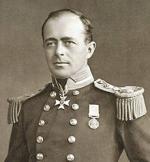Disable ads!
Robert Falcon Scott
Captain Robert Falcon Scott, CVO, RN (6 June 1868 – c. 29 March 1912) was a British Royal Navy officer and explorer who led two expeditions to the Antarctic regions: the Discovery Expedition, 1901–04, and the ill-fated Terra Nova Expedition, 1910–13. On the first expedition, he set a new southern record by marching to latitude 82°S and discovered the Polar Plateau, on which the South Pole is located. During the second venture, Scott led a party of five which reached the South Pole on 17 January 1912, only to find that they had been preceded by Roald Amundsen's Norwegian expedition. On their return journey, Scott's party discovered plant fossils, proving Antarctica was once forested and joined to other continents. At a distance of 150 miles from their base camp and 11 miles from the next depot, Scott and his companions died from a combination of exhaustion, starvation and extreme cold. Before his appointment to lead the Discovery Expedition, Scott had followed the conventional career of a naval officer in peacetime Victorian Britain. In 1899, he had a chance encounter with Sir Clements Markham, the president of the Royal Geographical Society, and learned for the first time of a planned Antarctic expedition. A few days later, on 11 June, Scott appeared at the Markham residence and volunteered to lead the expedition. Having taken this step, his name became inseparably associated with the Antarctic, the field of work to which he remained committed during the final twelve years of his life. Following the news of his death, Scott became an iconic British hero, a status reflected by the many permanent memorials erected across the nation. In the closing decades of the 20th century, the legend was reassessed as attention focused on the causes of the disaster that ended his and his comrades' lives. From a previously unassailable position, Scott became a figure of controversy, with questions raised about his competence and character. Commentators in the 21st century have on the whole regarded Scott more positively, emphasising his personal bravery and stoicism while acknowledging his errors and, more recently, errors by his team members, but ascribing the expedition's fate primarily to misfortune.
 Read more on wikipedia.org Read more on wikipedia.org
 All quotes by Robert Falcon Scott All quotes by Robert Falcon Scott
 Edit Edit
|

|
|
|
|
|
Background photo by Giuliana
|